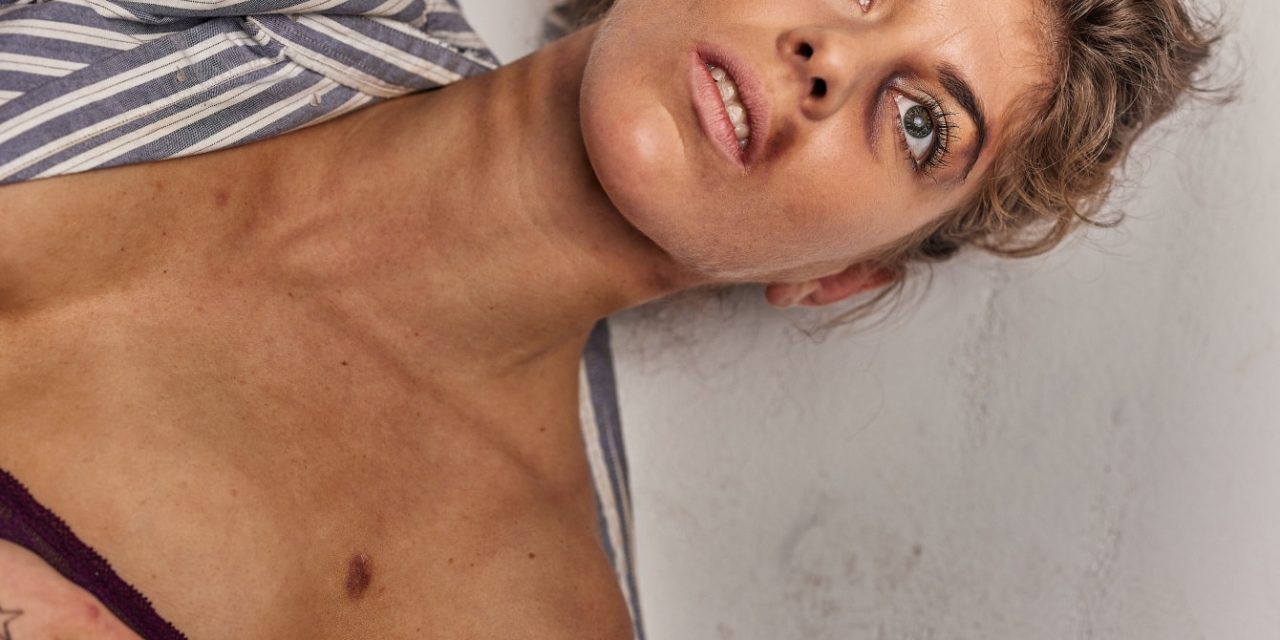The woman, who was beaten to the point of breaking her bones and was forced to live with a monocle for weeks, doesn't even think of later becoming a model for the horror, as an illustration. A crime cannot be illustrated with black underwear, artfully intrusive rope handcuffs, or smeared eye paint. Unless... Because then yes.
The announcement of the youth Olympic champion swimmer Liliána Szilágyi gave the final chord of the new year, when on December 29 she wrote on social media, among other things, that
"My father abused me. Physically. Spiritually. Sexually. From my childhood.”
But he didn't just write, he also talked about the traumas that happened to him, first in the season finale of Kriszta D. Tóth's series Elviszlek magammal , and then last night, in HírTv's Private Area program.
The answer came lightning fast, first from the publicly accused father, dr. Former swimmer Zoltán Szilágyi, now a lawyer, responded to Liliána's claims in an open letter , and the next day, on the 31st, Gerda, who lives with her father, also a swimmer, also spoke out. Both denied the allegations.
In a nutshell, that's the story, after which you can have a long discussion about who the public thinks is right, who it considers more credible, or which character's story it can identify with the most. Who do we sympathize with, who do we pity? There are quite a few who see Lilu's words as truth, the majority believe the girl, mostly myself anyway, despite her statements that her father beat her mother when she was in a blessed state with him. This was stated as a statement, without any circumlocution, such as "according to my mother". The beating of Eszter Gyarmati, who was expecting a child, really took place, Liliána, who was still a fetus at the time, obviously cannot remember, so someone informed her about it, which does not mean that it is not true; but that's not the point, it's how the siblings get stuck in the trenches between the parents. Because Gerda's reply letter also contains a similarly stupid statement as a rebuttal:
"My father never abused Liliana Szilágyi either. I dare to say this because I have been a member of this family since 2003 - i.e. my birth - and lived with them - so I was already very aware of these things during the indicated period, and if these things had happened, I would have known about them."
Do we feel that this proves nothing? Just as we also feel that the letter of the father and the girl living with him, Gerda, could be the work of the same hand. Aggression and anger are evident in both letters, the father even wants to deprive his eldest daughter of her name: you were bad, so look, this is how I will punish and humiliate you! It was as if she had lost her family name, which she had been given at birth.
"I would ask you - as I have already asked you before - to use your mother's family name instead of the name Szilágyi, because I do not think that it would be justified for you or me to call yourself Liliana Szilágyi in the future for any reason."
In any case, we are not wrong if we say that the relations of the Szilágyi-Gyarmati family have completely deteriorated. But why does this belong to the public? Why is Liliána accusing her father in public, if it is true that there are ongoing police/legal proceedings between the parties? Why not wait for the court's decision? Maybe someone advised you to do it this way and then? Maybe the goal is to use public opinion to put pressure on the court? Is that why the illustrative studio photos were taken, and why did the Hintalovon Foundation stand behind Liliána?
The following excerpt from the swimmer's new New Year's post specifically rhymes with all of this:
"Strength, because the community we started has overwhelming power. Because we are no longer alone, but connected to each other. Always, in every case, a miracle happens when we recognize the power of our society, community and most of all ourselves. I am only a representative of all this, but with all my words and actions I act with you and for you."
And then again: I identify with the story myself, why wouldn't I? I believe it, I can believe it. I am able to do it. At the same time, I get chills from the father's reactions, because he is an arrogant root. At least I think it is. A jackass, a rascally villain.
But none of that matters, because being a jerk isn't a crime. For now.
The public may feel one way or the other, but it is not for them to decide who is right, whether the physical and mental terror and rape happened or not. Because if we decide, we will only bring back the static judgment. Is this what we want?
It is worth recalling the case of national team captain László Kiss, because in many respects it rhymes with the present case:
"László Kiss, the federation captain of the swimmers, committed a crime 55 years ago when he was young. Part of the public was outraged. Especially the part that lived the old story as if it had happened yesterday, based on the carefully dosed bits of information. In the manhunt against Kiss, left-liberal forums and opinion leaders were mostly at the forefront, not least because László Kiss is considered "faithful" for some mysterious reason. In the intoxication of judgement, some legal principles, some of which are thousands of years old, were thrown into disrepute: Roman law already knew the concept of statute of limitations, which reflects the experience in the world of law that the effect of actions diminishes with time; after a long time the punishment no longer makes sense. It is also a long-standing legal principle that no one can be held responsible for the same act twice, and that the perpetrator is exempted from the consequences of the crime, such as the record of the criminal record, over time. Punishment is also guilt - at least they thought so in the past, and László Kiss was in prison. The left-liberal naysayers, who are always horrified by the alleged violations of the rule of law, have now easily overcome these legal principles, but they did not respect the privacy rights of László Kiss and the data protection rules either. The driving force behind the great indignation and the desire for re-judgment was largely the recent minority protection - human rights - feminist approach and impulse, which puts violent crimes against women on the same level as crimes against humanity. Because so far, only crimes against humanity have not been statute-barred. Women form the largest minority in society, as there are more of them than men.
Those who wanted to incapacitate László Kiss themselves felt that they were going against the principle of law, so they came up with the argument that although Kiss was legally guilty, his actions were not morally obsolete. The juxtaposition of law and morality to this extent is unprecedented, and may have even more serious consequences in the future.
What makes it relevant again is the case of Liliána Szilágyi. Dr. Zoltán Szilágyi is denied the presumption of innocence and the right to a fair trial, which is also required by the European Convention on Human Rights, as well as the right to a good reputation, which is guaranteed by the Basic Law. In such cases, one must proceed and make a judgment in the manner prescribed by law, not with a tabloid press campaign or public outcry.
In a few years, we have also reached the point - following the example of American fashion - that if a woman accuses someone, that's it, there is no need for additional evidence, the opportunity to provide a defense.
This is a mockery of thousands of years of legal principles, the destruction of the achievements of civilization." (Gábor Sebes)
In light of all this, I sincerely hope that the truth will be revealed as soon as possible; for the benefit of all of us. This is a terrible case: if it's true, why, if not, then why. If the swimmer's accusations stand the test of reality, let the father receive the punishment he deserves! But if not, then the same principle should apply to Liliana as well!












